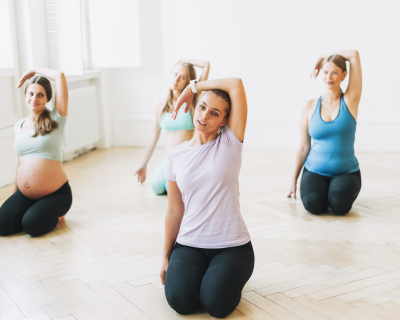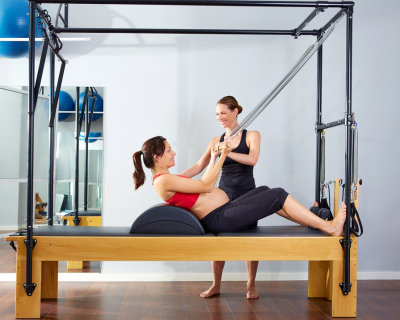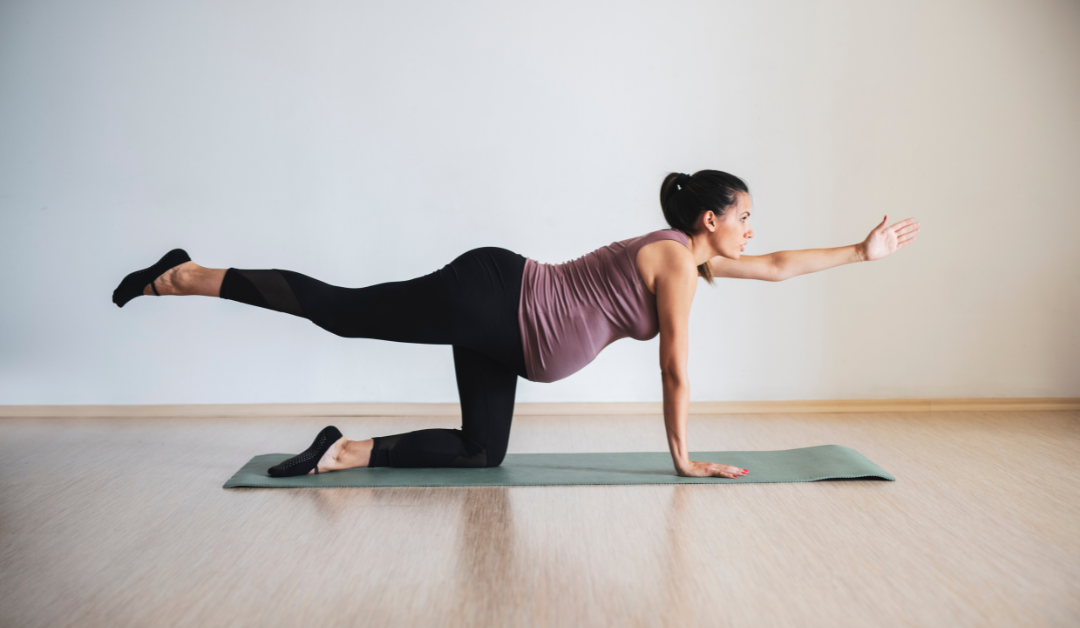Have you been considering Pilates but aren’t sure if it’s safe to do when pregnant?
Well Pilates is one of the most highly recommended forms of exercise for those that are pregnant or have recently had their baby. Specialist pilates instructors, often Physiotherapists, run classes specially designed for women who are experiencing massive changes to their bodies during this time.
What is Pilates?
Pilates is a whole body, low impact exercise system. There is a large emphasis on breath and a focus on balance, core strength, mobility and flexibility.
Pilates is a gentle form of exercise, which makes it safe for most people. It was originally created by Joseph Pilates in the 1920’s as a form of rehabilitation. Exercises are generally a range of simple, small sequences that are performed in low repetitions that lengthen and stretch all the major muscle groups in a balanced way. The focus is on quality not quantity and precision and control.
There are approximately 500 exercises to choose from. Therefore, there is a lot of flexibility to alter a workout for all different types of people, coming with all types of injuries or conditions.

Can I do Pilates when I’m pregnant?
Definitely. In fact Pilates is often recommended by your health practitioner to help assist with various pregnancy related ailments, such as back pain.
As the exercises are so versatile and wide ranging, a program can be adapted to suit all mums to be during all stages of pregnancy. Pregnancy Pilates classes ensure you are completing exercises that are specific to what your body needs and will also change as your body grows. There will also be modifications offered on each exercise, depending on how you are feeling on the day.
What is the main focus area when doing Pilates when pregnant?
Whilst Pilates is an all body workout, Pregnancy Pilates is focussed on building strength and control in your Pelvic Floor muscles, which play a vital role both pre and postnatally. The focus is also on relaxing the pelvic floor which is very important when birthing your baby.
The focus is also on increasing strength and stability in your hip and back stabilsing muscles, like the glutes. This will ensure you can cope with the structural and load changes in the back and pelvis in pregnancy, and give you the tools to reduce soreness and injuries now and in the future.
What are the benefits of pilates during pregnancy?
In short, pregnancy pilates helps you prepare for labour, sets you in good stead for recovery, focuses on pelvic floor health and helps prevent and manage diastasis recti.
Apart from the regular physical challenges, your pregnant body is experiencing an increased blood volume, heart rate and cardiac output, sometimes making you feel out of breath.
Pilates can also help calm the nervous system and lower blood pressure through Pilates breathing. It also builds the stamina that will be required for the challenges of labour.
Pilates has also been shown to assist with the postpartum recovery for both vaginal and caesarean deliveries.
Here are the main benefits of prenatal or pregnancy pilates (and also post natal) pilates –
- Reduced back pain and general aches and pains – Back pain is very common in pregnancy, along with other musculoskeletal issues. By strengthening your core, keeping a strong posture and gaining deeper body awareness, pilates can help you adapt to your new and growing body.
- Overcome issues related to Increased Relaxin – the increased hormone relaxin can cause issues with increased flexibility of ligaments and subsequently lower back pain and pelvic pain. Strengthening your core muscles helps overcome this.
- Prevent or Reduce Diastasis Recti – through improving the strength of your core and working with a professional pilates instructor, you can reduce the severity of diastasis recti which affects around ⅔ or pregnant women.
- Stronger Pelvic Floor – If your pelvic floor is weak, you are at higher risk of incontinence during or after pregnancy. It’s really important to learn how to strengthen and also relax the pelvic floor for pregnancy, labour and beyond.
- Decreased Stress – Pregnancy is stressful both mentally and physically. Pilates helps you with a calmer and more relaxed mind and helps ease tension held in the shoulder, neck and back muscles.
- Improved Breathing Control – Learning to connect with your breath and learn how to control your breathing is imperative for preparing for labour. Pilates breathing exercises can help you relax and reduce tension, and relax your ribcage to allow you to take deeper breaths.
- Maintain a Healthy Weight and Aid a Faster Recovery – Gaining too much weight during pregnancy puts you at higher risk of gestational diabetes and puts added stress on your body. Pilates can help you maintain a healthy weight and feel great during your pregnancy and assist with a faster recovery afterwards.
- Improved Posture with stronger Chest and Back Muscles – Pilates is amazing for correcting your posture, keeping muscles lengthened, and less stress on your joints and muscles. Keeping your chest and back muscles strong will also assist greatly with your daily activities postpartum, with carrying and feeding your new baby.

Is Pilates safe for me and my baby?
As mentioned previously Pilates is gentle and safe for all people under the correct supervision, including you and your growing little one. Pregnancy Pilates class sizes are often very small, so that you can feel fully supported by a trained instructor that understands the challenges of pregnancy and that each pregnancy is unique.
It is so important to keep active during pregnancy especially in the later stages, and Pilates exercises allow you to do that without placing unnecessary load or strain on your body or joints.
Before starting a pregnancy pilates program, however, it is advisable to gain clearance from your Doctor, Physiotherapist or other health care professional. If you are qualified as having a high risk pregnancy, like experiencing placenta previa or you have certain heart or lung conditions, all exercise may be unsuitable.
Precautions and exercises to avoid when pregnant
During pregnancy your body will change in order to carry your growing baby and eventually give birth. It produces hormones that will relax connective tissues around your joints, and this creates increased mobility and flexibility. Your centre of gravity also changes and all of these factors can cause misalignments and flare ups, or new injuries.
Your qualified pilates instructor will be well aware of the exercises that need to be altered to suit your individual stage of pregnancy, and other issues if any. Pilates during pregnancy will still work all your muscles just in a different way. The main area they will avoid is excessive abdominal work. Ab exercises will shorten these muscles and place added stress on the tissues and increase intra-abdominal pressure. While it is very normal to get some ab separation (diastasis recti), your pilates instructor can help minimise the degree, by avoiding too much emphasis on this area.
It is important not to lie on your back for too long as the uterus can compress the major vein (vena cava) and restrict blood flow to your baby. Most professional pilates studios will have specific props and accessories, like wedges, to allow pregnant ladies to lie on their back safely. They will also vary the exercises so that you are not laying down for long periods of time.
Due to the increased blood flow and respiratory changes in pregnancy, it is important to stay hydrated so you don’t overheat, and also listen to your body. If you ever start having unusual pain or other issues, inform your instructor immediately.
Things to remember when doing Pilates when pregnant
To get the most out of your pilates classes here are a few things to remember –
- Choose an instructor or studio that has extensive knowledge and training for pregnancy and post pregnancy pilates.
- Consult your Physio or Doctor prior to starting
- Wear light, comfy clothing
- Drink lots of water and have snacks on hand
- Be conscious to not overstretch
- Relaxing your pelvic floor muscles is equally important as contracting
- Concentrate on your Pilates breathing and not holding your breath
- If doing Mat Pilates take your time when coming up off the floor
- Try equipment or reformer pilates which offers more comfortable positioning and more flexibility with different spring levels
- Speak to your instructor if you have any concerns.
Pregnancy Pilates at Sandgate Physical Health Clinic
At SPHC we offer pilates classes for pre and postnatal care with our highly qualified and experienced Physiotherapists.
We love taking extra special care of our Mums and Mums to be, with our Pregnancy Pilates (Lifestyle or Clinical) classes that help to prepare your body for carrying the baby and child birth, and also looking after your new bub after delivery. We also run Mums n Bubs Pilates classes that not only help with your recovery, but are a lovely way to connect with your baby.
Note- Pre-class assessments are required before you join our Mums n Bubs classes. They will determine how your body is recovering and if it is safe for you to start classes.
Check out our class timetable and please call to book for your first session on 3869 1099. Read more about Pilates in our Beginners Guide to Pilates blog.
SPECIAL OFFER FOR OUR NEW MUMS AND MUMS TO BE!
We love taking extra special care of our Mums at SPHC, so for January and February 2024 we’re inviting all new mums, and mums to be, to join us for our Pregnancy Pilates classes or Mums N Bubs Pilates classes. Not only will your body thank you for it, you’ll also get a-
- Free pair of Move Active Pilates socks, and
- An entry into our draw to Win a 30 Minute Massage!*
*T&Cs Apply. New clients will receive 1 pair of Move Active socks on their first class only, get 1 entry into the draw for each class you attend from 1/1 to 29/2, winner drawn on 1/3/24.

